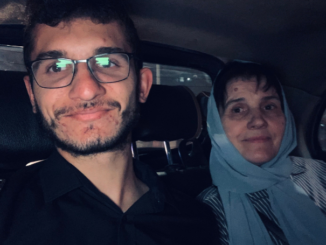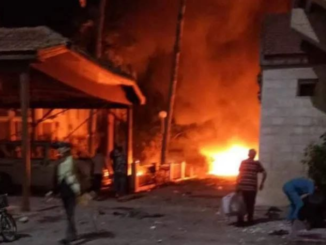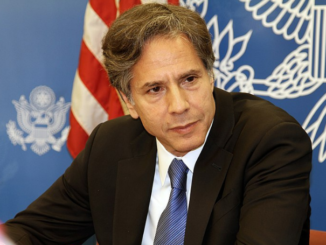
By Tai Kawabata
Make serious efforts to achieve an immediate ceasefire in the war in Ukraine and stop delivering weapons to Ukraine. This is a call a group of Japanese citizens including academicians made in their appeal to the G7 leaders.
In a move encouraging to the Japanese group, Noam Chomsky, a US theoretical linguist, and public intellectual, has come up with his support for its call for an immediate ceasefire while denouncing those who oppose it.
Commenting in his e-mail to this writer, Chomsky said, “The criticism (against the idea of an immediate ceasefire), which is the standard one, is intellectually and morally scandalous in my opinion. It assumes that if facing defeat, (Russian President Vladimir) Putin will quietly slink away to a bitter fate and not use the weapons which all know he has to escalate the war, if necessary obliterating Ukraine. It is a ghastly gamble with the fate of Ukrainians, while merely striking heroic postures.”
In calling the G7 leaders to set up a negotiation table for a ceasefire between Russia and Ukraine and to stop supplying weapons to Ukraine, the Japanese group said, “The war already shows signs of being a proxy war, with outcome determined by weapons provided by NATO countries.”
“Although Ukraine is reported to have started a counter-offensive in earnest, we believe that both Russia and Ukraine should start discussions toward an immediate ceasefire since no party wants an all-out war,” said Haruki Wada, a member of the 32-member group and professor emeritus (Russian/Soviet history and Korean history) at the University of Tokyo.
“Both countries should learn from the fact that about one year after the start of the Korean War in June 1950, formal ceasefire talks began and also from the fact that in the Ukraine war, formal ceasefire talks began five days after it began although they eventually collapsed,” he said.
Kenji Isezaki, another member of the group and professor emeritus (peace and conflict studies) at the Tokyo University of Foreign Studies, said that delay of a ceasefire in the Ukraine war will lead not only to an increase in deaths but also an increase in war crimes and fading of war crime-related evidence.
In Japan, voices have been raised, even from liberals, criticizing the group’s call for an immediate ceasefire in the war in Ukraine. They say that a ceasefire at this point will result in accepting Russia’s gains in Ukraine as fait accompli.
In response, Isezaki pointed out that a ceasefire is not a peace settlement but the laying down of weapons and that if a ceasefire is achieved, the international community can step in to ensure a just settlement that can be accepted by the two opposing parties.
“The current war is an extension of the war in Donbass, which started in 2014. Therefore a ceasefire at this point cannot be too early,” he added.
The Japanese group — “Japanese Citizens for Ceasefire Now in Ukraine” — published its opinion ad with the headline “‘Ceasefire Now in Ukraine’ and ‘No War in Our Region’” on the first day of the May19-21 G7 summit in Hiroshima, Japan, in The Japan Times, a Tokyo-based English-language newspaper, whose copies were distributed at the venue of the summit and hotels in the city where G7 summit-related people stayed.
On May 13, the group had published the opinion ad with a Japanese translation in the vernacular Tokyo Shimbun newspaper published in Tokyo and its adjacent areas. The group collected funds to run the opinion ad through cloud funding.
Kumiko Haba, another member of the group and president of the International Studies Association Asia Pacific, said the G7 leaders should learn from Hiroshima’s wartime history how great a suffering a delayed ceasefire causes to people.
“It must not be forgotten that the atomic bombings of Hiroshima and Nagasaki are nothing less than tragedies victimizing ordinary citizens caused by the Japanese government’s delay in accepting the Potsdam Declaration. As the war continued, some 210,000 people died from the atomic bombings of the two cities (by the end of December 1945),” said Haba, whose father was a survivor of the Hiroshima atomic bombing. Japan decided to accept the declaration, which was issued on July 26, 1945, as late as Aug. 14. Hiroshima was atomic bombed on Aug. 6 and Nagasaki on Aug. 9.
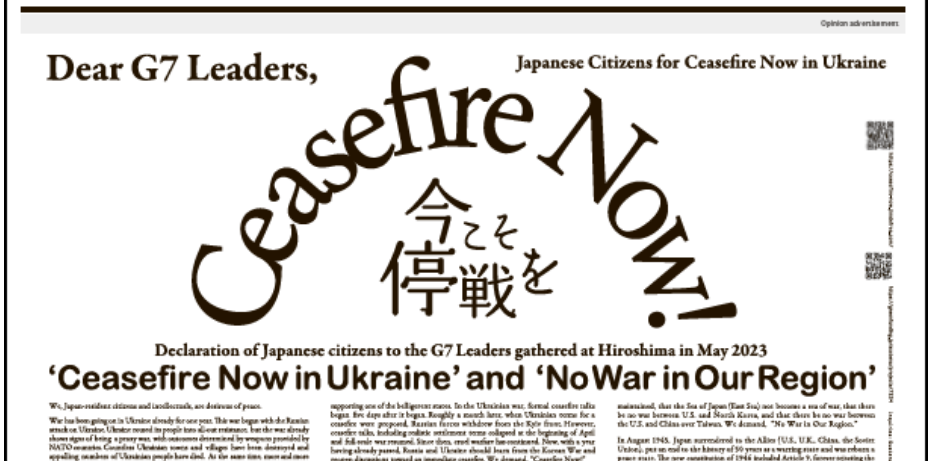
The group reminded in its appeal that “The threat of nuclear weapons and further combat over nuclear power plants is becoming increasingly real. Fighting must cease immediately.”
Haba said that the US, NATO, and Russia should promise not to use nuclear weapons in the Ukraine war.
“What is dangerous in the Ukraine war is Britain’s delivery of depleted uranium ammunition to Ukraine and Russia’s reaction in the form of deployment of tactical nuclear weapons in Belarus. Britain should stop the delivery immediately because the use of depleted uranium ammunition in Eastern Ukraine will cause radioactive contamination lasting for a long time – a maximum half-life period being nearly 4.5 billion years – injuring both Ukrainians and Russians and contaminating food and animals,” she said.
She pointed out that the UN Subcommittee on Prevention of Discrimination and Protection of Minorities mentioned depleted uranium ammunition along with nuclear, chemical, and biological weapons and cluster bombs in its August 1996 resolution calling on all states to “curb the production and the spread of weapons of mass destruction or with indiscriminate effect” and that the May 2008 European Parliament resolution urged the EU member states not to use depleted uranium ammunition in their military operations.
US soldiers were exposed to radiation when the US used depleted uranium ammunition in the Gulf War, the Iraq War, Bosnia, and Kosovo and the EU protested and the US apologized when Italian soldiers suffered through the US’s use of such ammunition in Serbia, she added.
The Road to Fascism: How the War in Ukraine is Changing Europe
Isezaki said, “Our basic stance is that Russia must stop its aggression against Ukraine and that the US and NATO must stop the proxy war in that country,”
If outside parties, that is the US and NATO, are delivering weapons to a country, that is Ukraine, for the purpose of weakening another country, that is Russia, it must be termed a proxy war, he said.
“If some party says that the war in Ukraine is not a proxy war, it should be condemned as an evil political act that sacrifices the lives of ordinary citizens of Ukraine,” he said.
Experience shows that weapons supplied to a party involved in an armed conflict will be used again in a future conflict, as happened in Afghanistan involving the US and NATO in a 20-year-long war in that country, he added.
Isezaki played a central role in disarming the armed groups in Afghanistan as a special representative of the Japanese government. Prior to this mission, he had a deep experience in the UN peacekeeping operations. In East Timor, he served as provisional governor of the Cova Lima Municipality to oversee the UN civilian police and peacekeeping force. in In Sierra Leone, he led the UN Disarmament, Dismobilization and Reintegration mission. As of this writing, he was in the Philippines at the request of the UN to mediate between the Filipino government and the Moro Islamic Liberation Front on a disarmament mission.
The Japanese group said in its appeal, “Neutral countries of the Global South, especially China and India, should play the role of arbiters.” It then called on Japan to work as a mediator for a ceasefire, alongside China and India, with the backing of the other G7 nations.
The group supports Haba’s proposal to create an UN-sponsored peacekeeping force manned by soldiers from Asian and African countries, send it to Ukraine and set up a large buffer zone in order to ensure a ceasefire.
Isezaki explained that the presence in the peacekeeping force of soldiers from countries that have no hand in the war will increase the force’s deterrence capabilities.
Commenting on Ukraine’s counter-offensive and the G7 leaders’ renewed commitment in their Hiroshima summit to provide military and other support to the country for as long as it takes, Wada said, “Endlessly supporting Ukraine in the name of assisting its resistance but at the same time for the purpose of weakening Russia is nothing less than a tragedy of continuation of the death of both Ukrainians and Russians.
“The US wants Ukraine to thoroughly grind Russia down inside Ukrainian territories. But it is ambiguous as to whether it will let Ukraine get back Crimea. If Ukraine wants to regain the peninsula, it needs to attack Russian territories. This will turn the war into a war fought inside Russian territories. But the US, which wants to avoid a US-Russia war at any cost, does not want Ukraine to carry the attack on Russia proper. Thus the war in Ukraine involves contradictions. Given these factors, the natural course of action for the G7 nations should be to persuade Ukraine to start ceasefire talks with Russia although they are continuing to assist that country.”
The Japanese group also stressed that the expansion of the Ukraine war beyond Europe must be prevented at all costs.
Wada said that the war must be prevented from spilling over to Northeast Asia in the form of “heightened military pressure” in the region whose security environment is already dangerous with tension mounting between the US and North Korea over the latter’s nuclear weapons development and between the US and China over Taiwan.
Active ‘Neutrality’: Why Is Israel Struggling to Maintain a Coherent Position in Russia, Ukraine?
The group also warned that the prolongation of the Ukraine war will further escalate global warming. For example, the exclusion of Russia from the mechanism to coordinate international interests in the Arctic will lead to the melting of the Arctic ice, affecting other parts of the globe.
The group has delivered its appeal to the embassies in Tokyo of the US, Britain, France, and Germany and plans to do the same with the embassies of other G7 nations. It also has delivered the appeal with a Japanese translation to the parliament offices of all the Japanese lawmakers, including Prime Minister Fumio Kishida.
It is continuing a campaign to collect signatures from the public through the Internet to support its appeal. As of this writing, it collected some 7,700 signatures, above its earlier goal of 7,500 signatures. The group has set a new goal of 10,000 signatures.
The 32 members of the group included Chizuko Ueno, professor emeritus at the University of Tokyo, who is a leading feminist sociologist in Japan; Tatsuru Uchida, professor emeritus (philosophy) at Kobe College and martial artist, who is an expert on Emmanuel Levinas, a French philosopher of Lithuanian Jewish ancestry, and a commentator on social and political issues; Yuko Tanaka, a former president of Hosei University in Tokyo, who is an expert on the culture of Japan’s Tokugawa period (1603-1868) and a commentator on social and political issues; and Soichiro Tahara, a veteran journalist with a vast network of news sources including leading politicians.
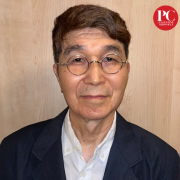
– Tai Kawabata has been working as a freelance writer since the beginning of 2020 after working for The Japan Times from 1971 to 2019 (chief editorial writer 2005-2013). He contributed this article to The Palestine Chronicle.

